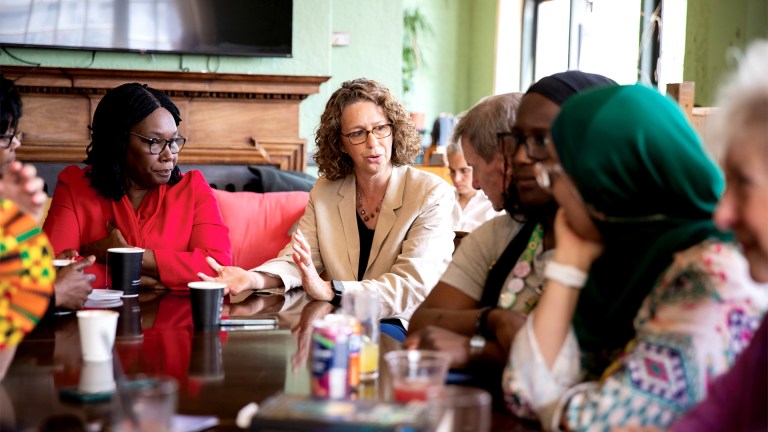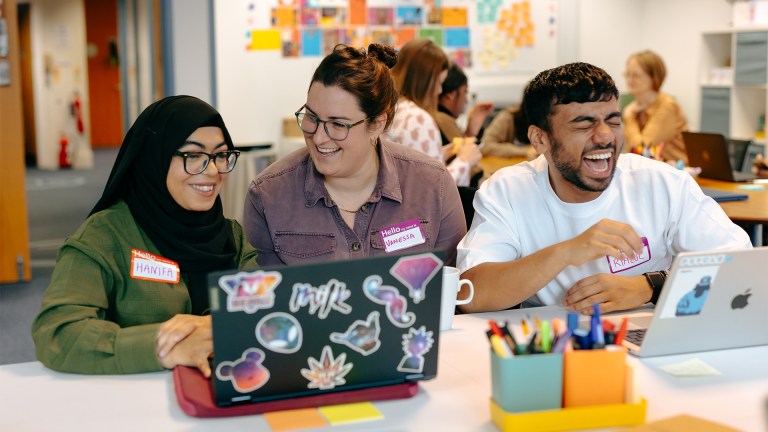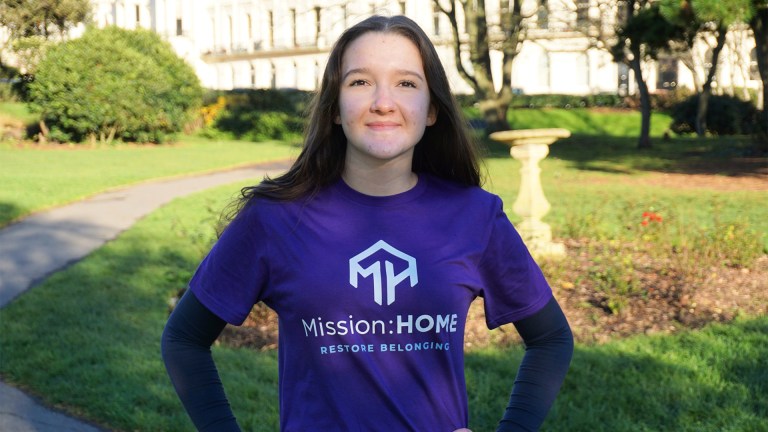“People are scared right now though, and don’t know who to trust. Even as well meaning as it may be approaching people to offer support, they may not want to risk accepting it,” said Ramadan.
“We need communities to come together when it is safe to do so, to show solidarity and support, but we also need everyone to recognise the fear which people are facing right now.”
Here are some ways to show your support and solidarity for asylum seekers and refugees in the aftermath of the riots across the UK over the weekend.
Host a refugee or asylum seeker at your home
Once an asylum seeker is granted refugee status, they are given limited time to find somewhere to live. These short-notice evictions mean many end up on the streets. But a number of hosting organisations connect refugees with hosts. It does not just prevent homelessness, the groups say, but improves integration and provides a valuable experience for both parties.
Organisations include Refugees at Home and Hope at Home.
“We really do offer a safe place to stay for people who’d otherwise have nowhere,” said Sara Nathan, co-founder of Refugees at Home.
Advertising helps fund Big Issue’s mission to end poverty
“We welcome people with a spare room, living in towns or cities all over the UK. It can make all the difference at a difficult point in people’s lives.”
You can find out more here.
Attend anti-racism marches if safe to do so
Anti-racists marched to counter the riots over the weekend. Stand Up to Racism is running protests on 10 August to say refugees are welcome here.
“We are the many, they are the tiny minority,” the organisation claims.
Samira Ali, the national organiser for Stand Up to Racism, told The Guardian: “We’re fighting as hard as possible to get as many people in a coalition around the country to make sure that these protests are opposed,” she said.
“What demoralises [far-right protesters] on the day is people standing together as a broad mass movement and fighting back. The far right might think they’re part of something bigger, but we know that we are in fact the majority, and we’re trying to mobilise that.”
Advertising helps fund Big Issue’s mission to end poverty
Keep an eye out on standuptoracism.org.uk for updates on when anti-racism protests are taking place – but importantly, make sure you prioritise your own safety. If you think you may not be safe at any of these events, do not attend. There are many more ways to show your support.
Support organisations who support asylum seekers, refugees and marginalised people
There are many organisations across the country which are supporting asylum seekers, refugees and marginalised people. Help them in any way you can – that might be through volunteering, donating money, or simply spreading their message on social media.
Organisations include Hope Not Hate, Migrant Voice, Women for Refugee Women, Refugee Action, Choose Love, Amnesty UK, Unicef, British Red Cross, Refugee Council, Care4Calais and many more.
As well as national charities, many communities will have local refugee support groups, offering support to those going through the asylum system.
Take part in an event to raise money for asylum seekers and refugees
There are plenty of events you could take part in to raise money for asylum seekers and refugees. Race for Refugees is run by Refugee Action and is for people who want to take on a challenge of their own choice at some point between 1 September to 30 September.
This could be running a mile a day for the month, cycling across the country, walking 10,000 steps a day, or whatever you like.
Advertising helps fund Big Issue’s mission to end poverty
Otherwise, there are organised events, such as the London Landmarks Half marathon in April 2025. You can find more organised events through Refugee Action.
Do not share information online which identifies accommodation where asylum seekers may be staying, advised Carenza Arnold, from Women for Refugee Women.
She also urged people to consider whether the information you are sharing is true or whether it is a fabrication which could intensify divisions.
Arnold explained that an explosion of disinformation and racist vitriol spread online was a major cause of the riots.
“Fuelled by the spread of racist disinformation online – propped up by tech platforms who financially gain from the virality of extremist content – the riots are Islamophobic and racist,” she said.
“Words matter. The effects are now visible in the violence we have seen this week. Dehumanising, divisive and racist language has become normalised.”
Advertising helps fund Big Issue’s mission to end poverty
Share positive words and welcoming messages
Positivity is vital in counteracting hateful rhetoric, whether that is in person among your friends, family, colleagues and in your community, or more widely online.
Refugee Action points out: “A kind word or a smile can make such a difference to all of us. But it can mean even more to someone who has been forced to flee their home because of war and violence. It lets them know that they’re not alone.”
People can take part in Refugee Action’s Welcoming Messages action, where people can write words of kindness, solidarity and welcome to people who have come to the UK to seek safety.
Get in touch with your MP and sign petitions
This is a political issue, and politicians must step in to ensure change, charities and campaign groups have said.
Ilyas Nadgee, racial justice director at Amnesty International, added: “We must demand that our government enshrines human rights for all and resets the national debate where for far too long, vulnerable people have been vilified including by those holding the highest offices.”
Individuals can get in touch with their MP to demand action, or sign petitions calling for change.
Advertising helps fund Big Issue’s mission to end poverty
Hope Not Hate has a Hold on to Hope campaign aiming to transform the current climate into a movement of hope and community action. It is aiming to reach 10,000 signatures.
Arnold added: “This anti-Muslim, anti-asylum-seeker and anti-migrant hostility has not emerged from a vacuum: it has been shaped and fuelled by successive draconian asylum policies and laws and stoked by some politicians and elements of the media
“This harms us all. The communities that are being targeted by the racist far-right must be protected, and all those responsible for the deplorable violence held accountable.”
Buy a Big Issue magazineand support our vendors
The Big Issue has a history of working for marginalised and displaced people, a mission that is increasingly vital at times such as this.
We have a large number of Big Issue vendors from the Roma community and other ethnic minority backgrounds who may be feeling concerned for their safety right now. Show your support by buying a Big Issue magazine and being kind to our vendors.
Do you have a story to tell or opinions to share about this? Get in touch and tell us more. Big Issue exists to give homeless and marginalised people the opportunity to earn an income. To support our work buy a copy of the magazine or get the app from the App Store or Google Play.
Advertising helps fund Big Issue’s mission to end poverty









